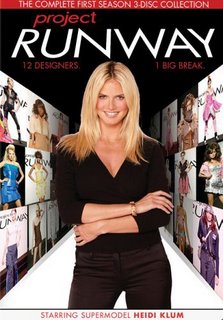The Storytelling Magic of Project Runway

I hate so-called reality shows, but Bravo’s Project Runway has me hooked. Why? Because the producers of this show know how to tell a story. Boy, can they tell a story.
Those who think reality shows have any basis in reality would be disillusioned quickly after a three-minute conversation with anyone in the industry. Reality shows need a hook, compelling characters, and a narrative that keeps the audience coming back over a 16-week period. Just like a good novel, the narrative must meet the audience’s expectations while offering surprises, reversals of fortune, and high stakes.
The lesson of Project Runway is instructive because reality t.v. is teetering on the brink of becoming a caricature of itself. But this particular show has broken through the glut to become one of the hottest reality shows. Why? It’s the setting. And therein lies a lesson for writers of genre fiction.
Project Runway’s premise is standard in the reality t.v. genre. Aspiring designers compete in a series of design challenges. If they win, they receive a fabulous array of prizes. Whoopdie do.
But that’s the point of departure. It’s the setting that’s the lure. It’s not an island where people eat bugs, or aspiring singers warbling before a panel of vicious judges. Yawn. We’ve seen it all before. Project Runway differentiates itself from the pack by being set in the center of the fashion universe, New York City. The industry itself drips of beautiful people and beautiful clothing, ingredients you could find in L.A.’s fashion world, but wisely the producers of Project Runway understand that NYC has an irreproducible grungy glamour. They then proceed to lift the veil (bad metaphor, I realize!) and treat us to envy, jealousy, desire, ambition, all the ingredients of for compelling storytelling.
Like genre t.v., genre fiction by definition follows certain unspoken rules that dictate the setting. Chick-lit novels take place in the big city. Fantasy novels unfold in a vaguely medieval world. Writers of genre fiction wrestle with the problem of setting every time they start a new project. But it pays to think outside the box when it comes to setting.
If the feedback you’ve been getting from your critique group or rejection letters is, “nice story, nothing special,” consider a fresh venue for your story. You could find it’s just what was needed to give your genre fiction novel new life and set it ahead of the pack.

 posted by Kathleen Bolton at
posted by Kathleen Bolton at 


1 Comments:
Great post. Another thought: Start your readers with a predictable setting, them move 'em out. Reality TV example: Beautiful uptown girls in glam dresses and high-gloss nail polish arrive in LA to fight for one "Mr. Right," but then--surprise--must stuff their frills into a sky-dive suit, hop in a plane, fly to the Australian outback, jump out (!) and fight for one "Mr. Jack" without makeup and while fighting biting bugs. Hmmm. Good hook.
Post a Comment
<< Home